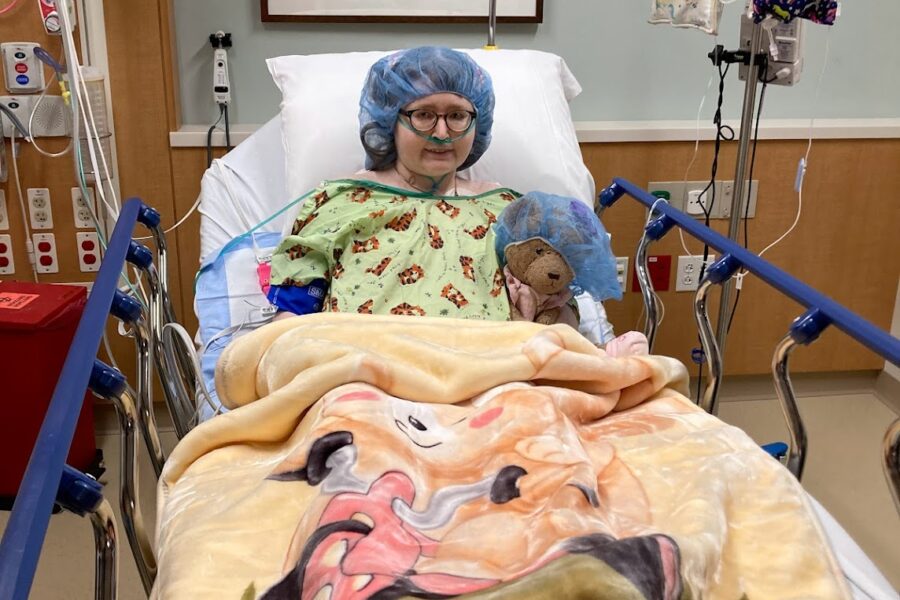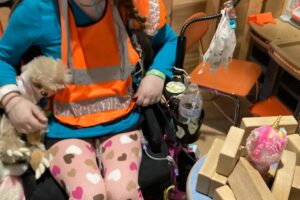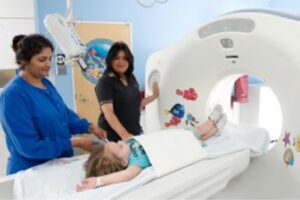Table of Contents
My entire hospital stay ended up being a total of about three months long. I went through a bunch of different phases in that hospital stay, but it all culminated in finding out the answer to the question, “What gastroparesis is”.
The Phases of Finding Out What Gastroparesis is
During phase one I was a medical patient needing medical care due to a physical illness. I remembered how relieved I had felt when I had achieved this phase.

Then there was Phase Two where I was a psychiatric patient who was experiencing treatment that was bordering on abuse by the psych unit staff. After that came Phase Three, being a surgical emergency. That’s when they raced me in the wheelchair down the hall to the CT scan machine and then pulled me out, put me on a stretcher, and ran me down to the OR.
Phase four was when I was a medical patient trying to find out what gastroparesis is.
I had been telling the nurses on the psychiatric unit that I was in severe pain and that my nausea was intensifying, for a good week and a half before I got so sick. If the nurses had listened to me or checked my vital signs more often, my bowels probably wouldn’t have perforated. But I was just a kid, and I was just a psych patient, what did I know?

The Meeting to Discuss What Gastroparesis Is
When the regular doctor and the GI doctor came in to discuss the results of all my testing in total, I smiled anxiously at them.
They pulled up chairs for themselves near the chairs my parents were sitting in around my bed that was loaded up with my whole crew of build-a-bears, heart monitor wires, IV lines, call bell, and all my other medical equipment.
They explained to my parents and me that I not only had an incurable chronic disorder called gastroparesis but that I also had a very severe case.
I found out that my stomach is pretty much paralyzed. It can’t absorb or digest food.
I watched my dad’s response as he listened to the doctors. His face was turning red, there was practically steam coming out of his ears.

Trying to Prove to My Dad That There’s No Way I’ve Been Faking
“What is gastroparesis? She doesn’t have any crazy diseases like gastroparesis,” my dad insisted, “I’ve had a nervous stomach my whole life, she must have inherited it. You’re catering to her hypochondriasis by saying that she has an actual medical diagnosis.”
“But Max, she had concrete medical tests that she couldn’t fake. It proves that she has to have an actual medical diagnosis.” My mom pointed out. But then she went and asked if anxiety was a known cause for this gastroparesis monster.
For a moment I just sat there, feeling too many emotions at once to react.
The diagnosis made all too much sense to me.
A huge sense of relief had washed over me for knowing what gastroparesis is and that I had a name for the monster that had been overwhelming my life for the last two years.

Wanting My Parents to Acknowledge my Medical Condition
I felt validated for knowing I wasn’t just imagining symptoms out of stress.
Then I felt confused as to why no one had caught this earlier. Why were doctors and nurses and adults in general so bad at listening?
The feeling that resonated the most with me was anger. I was angry with my parents for not believing in the physical pain and suffering that I was going through. They believed that I was suffering mentally, and would offer endless support around the schizoaffective disorder but they discounted the main source of my agony which was the physical pain, relentless nausea, and debilitating fatigue. This, in turn, did cause deep emotional wounds that scorched like severe burns.
“So what do we do to treat this gastroparesis disease?” my mom asked.
“We will have to take her down to the pediatric procedures unit where we will give her what we call monitored anesthesia care.” The doctor began.

Monitored Anesthesia Care
“What’s monitored anesthesia care?” my mom asked, taking notes on her phone.
“It’s a type of anesthesia where she will be completely out, but we won’t need to intubate her, she will still be able to support her own airway. An anesthesiologist delivers the medication. We usually use the medication Propofol combined with a pain med like Fentanyl and a relaxant like Versed.” The doctor explained.
“Propofol, like with Michael Jackson?” my dad asked.
“Well yes, but Michael Jackson wasn’t using it with an anesthesiologist controlling it while he was hooked up to 10 L of oxygen and every kind of monitor possible, plus the availability to resort to general anesthesia if anything started to go wrong,” the doctor explained.
My dad just made a humph sound.

NJ Tube insertion
“Once she is asleep we will use X-ray guidance to insert a special feeding tube in through her nose like an NG tube but it will bypass her paralyzed stomach and go all the way into the middle of her small intestine. We call that area the jejunum. With the NJ tube she can still receive all the nutrition and medication she needs, just not by her stomach where at the very least it will sit there and not be absorbed but it will also cause more nausea, vomiting, bezoars, obstructions, and perforations.”
“I don’t like this idea. She doesn’t need a tube in her face all the time. She just wants the attention,” my dad kept insisting.
“Look, the alternative is slowly watching her starve to death. Is that what you want?” my mom asked my dad. His fist tightened and then released.
“I guess we better sign the paperwork for her to get this damn tube stuck on her face,” he begrudgingly changed his mind.

What is Gastroparesis? Monitoring for Refeeding Syndrome
They put the tube in the next day. Then I had to stay at the hospital about a month after the meeting with the brand-new tube in place because that’s part of what gastroparesis is.
We had to start my feedings very slowly, at just 5 ml an hour. This was because my body wasn’t used to having any nutrition in it, if we went up too fast not only would I feel super nauseous, but I’d also be at risk for something called refeeding syndrome. The refeeding syndrome causes dangerous electrolyte imbalances which could cause severe edema and heart failure.
Going Home With the NJ Tube in Place
The NJ tube was a relief. It was way different than the NG tube had been, even though they both went in through my nose. The NJ tube was much thinner more flexible and more comfortable. It made my eyes water less and my nose runs less. The best part about it was that I was no longer constantly nauseous and bloated and my pain was decreased since I was no longer having weeks and week’s worth of food piling up in my stomach and no obstructions or bezoars were developing. Those symptoms were the worst part of what gastroparesis is.
Finally, I went home a few days before my eleventh birthday. I still had my NJ tube in place and was in less pain, but the monster was still lingering in the background, and my dad refused to look at my face.
Discover more from chronicallyalive.org
Subscribe to get the latest posts sent to your email.





